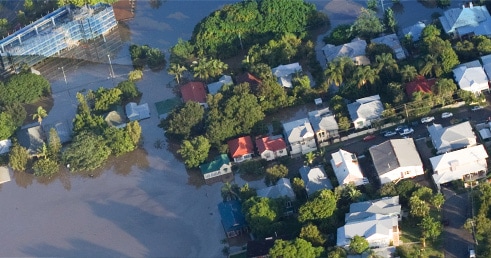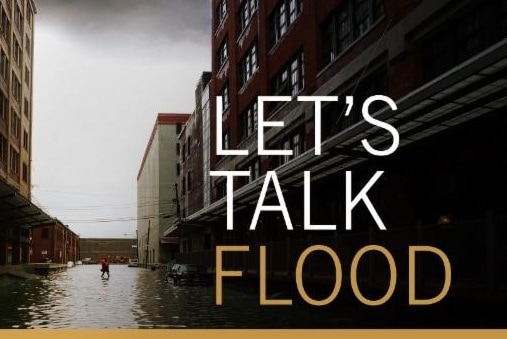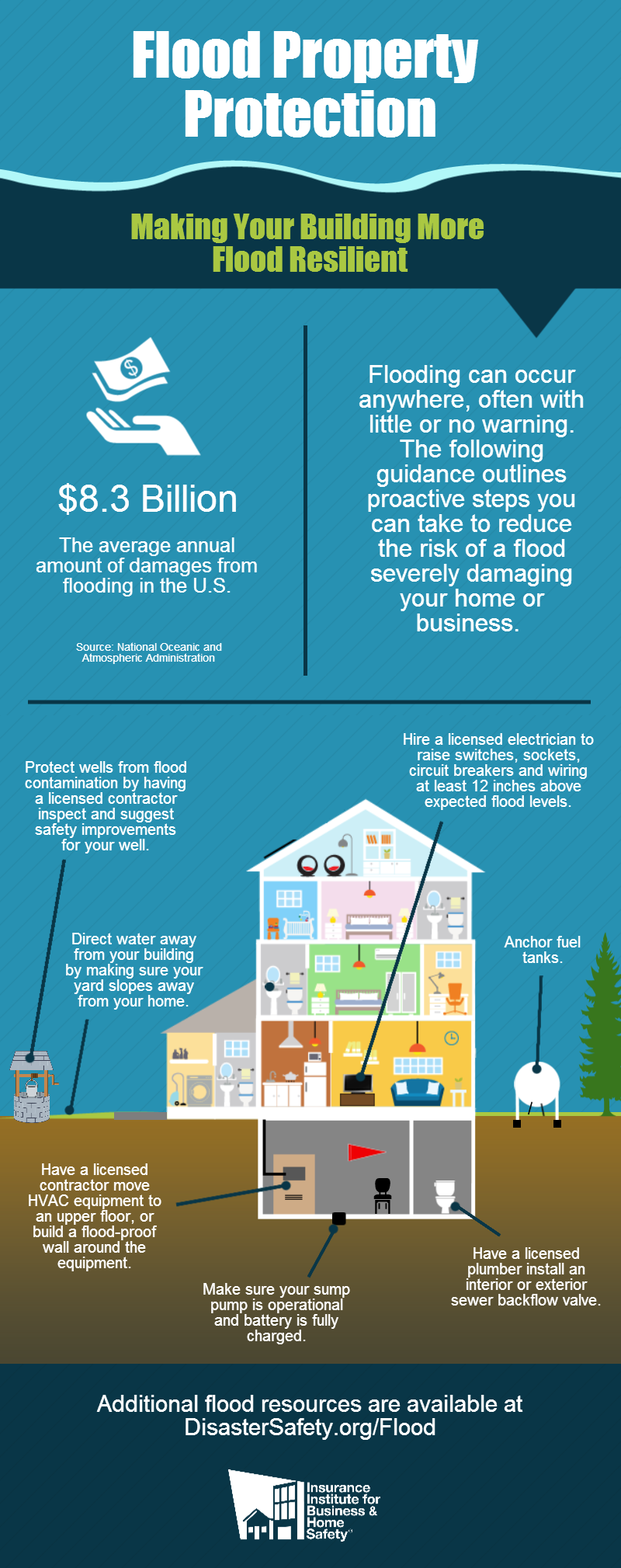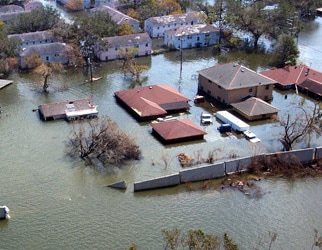|
What Is a Hurricane?A hurricane is a kind of tropical cyclone that includes organized thunder storms but no fronts. (Fronts are two air masses of different densities, such as cold fronts and warm fronts.) Tropical cyclones are measured in escalating degrees: When the winds in a cyclone are below 39 mph, it is considered a tropical depression. When the maximum sustained winds in a tropical cyclone reach 39 mph, it graduates to a tropical storm. Finally, when those winds sustain 74 mph or higher, the cyclone graduates further to a hurricane.
Hurricanes are not the same thing as tornadoes. Many people falsely believe that hurricanes are simply tornadoes forming over the ocean. In fact, the only thing the two have in common is that they are both swirling, destructive columns of air. The main differences between hurricanes and tornadoes are:
Hurricane Damage ScaleHurricanes, like tornadoes, are defined by categories on the “Saffir-Simpson scale.” This scale measures the potential for damage caused by hurricanes, based on the strength of the sustained winds. (Sustained winds are those that last one minute or more.)
Interesting Hurricane Facts
0 Comments
Leave a Reply. |
Insurance InfoFor all the latest up to date insurance rates for Cape Cod, MA. CategoriesAll 5 Ways To Prevent Your Basement From Flooding Arbella Insurance Auto Insurance Bad Weather Driving Best Boat Insurance Best Car Insurance Best Insurance Best Policy Bourne Flood Insurance Bourne Home Insurance Buildings Buildings And Content Insurance Cape Cod Boat Cape Cod Flood Insurance Cape Cod Home Cape Cod Home Insurance Cape Cod Home Insurance Best Cape Cod Home Insurance Marthas Vineyard Insurance Falmouth Home Insurance Mashpee Home Insurance Cape Cod Home Insurance Falmouth Home Insurance Cape Cod Real Estate Cape Cod Home Insurance Falmouth Home Insurance Cape Cod Real Estate Universal Home Cape Cod Home Insurance Falmouth Home Insurance Cape Cod Real Estate Universal Home Universal Property Cape Cod Insurance Agency Home And Auto Insurance Car Insurance Car Owner Guides Centerville Home Insurance Home Insurance Agent Cape Cod Insurance Agent Cape Cod Insurance Agency Home And Auto Insurance Coastal Agents Alliance Community Outreach Contents Contents Insurance Dennis Home Insurance Yarmouth Home Insurance Vineyard Haven Home Insurance Nantucket Home Insurance Disability Safety Disaster Safety For People With Disabilities: What To Do When Emergency Weather Strikes Do I Need Flood Insurance Driver Safety Driving To Safety: The Car Owner's Guide To Emergency Evacuation Emergency Evacuation Emergency Evacuation Preparedness Falmouth Flood Insurance Falmouth Home Insurance FEMA Flood Program Flash Flood Safety: 5 Must Ask Questions Flash Flood Safety: 5 Must-Ask Questions Flood Flood Damage Flooding Flood Insurance Flood Insurance Costs Flood Insurance Rates FLOODS AND YOUR LIVESTOCK Guide Guide To Safe Driving Home Home And Car Insurance Home Insurance Home Insurance Agent Cape Cod Insurance Agent Cape Cod Insurance Agency Home And Auto Insurance Home Insurance Cape Cod Home Insurance Best Cape Cod Home Insurance Marthas Vineyard Insurance Falmouth Home Insurance Home Insurance Cape Cod Home Insurance Best Cape Cod Home Insurance Marthas Vineyard Insurance Falmouth Home Insurance Mashpee Home Insurance Sandwich Home Insurance Bourne Home Insurance North Falmouth Home Insurance Marion Home Insurance Household Insurance Information & Resources Insurance Insurance Emergency Strikes' Insurance Flood Insurance Policy Maps: Which Parts Of The U.S. See Flash Floods Most Often? Marion Home Insurance Plymouth Home Insurance Dennis Home Insurance Yarmouth Home Insurance Mashpee Flood Insurance Mashpee Home Insurance Mashpee Home Insurance Sandwich Home Insurance Bourne Home Insurance North Falmouth Home Insurance Narragansett Insurance National Flood Insurance Program Plymouth Home Insurance Dennis Home Insurance Yarmouth Home Insurance Vineyard Haven Home Insurance Nantucket Home Insurance Yarmouth Home Insurance Possessions Preparing For Vehicle Emergencies Prevent Flooding Replace Right Insurance Safe Driving Guides Safety Guide Safety Guides Tags: Safety Safety Insurance Sandwich Home Insurance Sandwich Home Insurance Bourne Home Insurance North Falmouth Home Insurance Marion Home Insurance Plymouth Home Insurance The Ultimate Guide To Hurricane Facts Universal Home Universal Property UPC Insurance MPIUA Mass Property Fair Plan Fair Plan Alternative Universal Insurance Universal Property UPC Insurance MPIUA Mass Property Fair Plan Fair Plan Alternative UPCIC Insurance UPC Insurance UPC Insurance MPIUA Mass Property Fair Plan Fair Plan Alternative Vehicle Emergency Kit Vehicle Safety Vineyard Haven Home Insurance Nantucket Home Insurance Yarmouth Home Insurance Centerville Home Insurance Water Damage Wind Vs. Hurricane Deductibles Wright Flood Yacht Insurance Yarmouth Home Insurance Centerville Home Insurance Home Insurance Agent Cape Cod Insurance Agent Archives
June 2021
|
-
HOME
- Cape Cod, MA - Send me a Home Quote
- Cape Cod, MA Home Insurance Protection
- Arbella Insurance Discounts
- Lloyds of London History
- Safety Insurance Discounts
- Cape Cod Massachusetts - Alternative to MPIUA - MA Property Insurance Underwriting Association "Fair Plan"
- Cape Cod Real Estate
- Hurricane Preparedness
- Hurricane Survival
- Hurricane Aftermath
- FLOOD
- Cape Cod Home Insurance
- AUTO
- BOAT
- BUSINESS
- LIFE
- OFFICES
- ABOUT US
- eServices
- Agent Login
- Contact Us
- Privacy Policy
-
HOME
- Cape Cod, MA - Send me a Home Quote
- Cape Cod, MA Home Insurance Protection
- Arbella Insurance Discounts
- Lloyds of London History
- Safety Insurance Discounts
- Cape Cod Massachusetts - Alternative to MPIUA - MA Property Insurance Underwriting Association "Fair Plan"
- Cape Cod Real Estate
- Hurricane Preparedness
- Hurricane Survival
- Hurricane Aftermath
- FLOOD
- Cape Cod Home Insurance
- AUTO
- BOAT
- BUSINESS
- LIFE
- OFFICES
- ABOUT US
- eServices
- Agent Login
- Contact Us
- Privacy Policy
Search by typing & pressing enter






 RSS Feed
RSS Feed
